|
Reprinted from |
|
Each year, ATA Master, Senior Master and Chief Master Candidates who are striving to master themselves and their art participate in an intense training regimen (see "The Process" below). With both mental and physical components, this regimen facilitates a transformation, an education and a growth process for the candidates as they attempt to achieve greatness within the Songahm family. Challenges That Change
Another mental challenge involves writing about the nine elements of becoming a Master: vision, respect, knowledge, humility, loyalty, gratitude, honor, nobility and mastership. Each candidate writes an essay on each of these qualities Schreiber says this writing exercise was one of the most meaningful, fulfilling aspects of the process. "It really required me to think more deeply about the meaning of all this training I've done for the last 25 years," he says, "and how it applies in my life in the do-jahng, as well as outside the do-jahng."
To make space for this intense training in their lives, candidates sometimes must change the way they organize their lives--a process that can be quite positive. "It was very demanding time-wise, running my schools, raising two toddlers, and I moved school locations twice in the past year," says Hockman. "It forces you to be good at time management, and that's a skill set a Master should have. You have to be organized, focused, and sometimes find new ways of doing things." For example, to balance workout time with family time, Hockman got creative. "I started loading [the kids] up in their strollers and pushing them along in front of me while doing my running," he says. "By combining the two activities, I didn't miss any family time--and it turned out to be good family time--and I actually got a better workout." Schreiber's training encouraged him to consider his life and its direction. "Before this process, I was balancing Taekwondo experiences with the rest of my life and my activities, working full-time as a public defender," he says. "I had to re-evaluate what I want to do, if I wanted to make martial arts a full-time career."
Responsibility Plus "I'm much more aware of the importance of transmitting the values I've been thinking about so much this year, making sure my students understand how the things they learn in class translate into behavior outside the do-jahng," Schreiber says. Hockman agrees. "It does add more responsibility," he says. "Instead of just representing myself, I'm an ambassador for the entire organization." One responsibility important for any Master is earning others' respect. And respect doesn't come automatically with the title. As Schreiber says, "It doesn't entitle you to respect you haven't earned--people are more aware of who you are, and you have a responsibility to continue to earn their respect." Staying fit is another responsibility of mastership, says Senior Master Candidate Rick Abair: "We have a responsibility to ourselves as well as the organization to stay in good physical shape and set realistic goals once we are a Master." Further Growth
Senior Master Candidate Mark Sustaire also noticed differences in the two processes. "They are comparable, but earning my Master title gave me a sense of finishing something I started years ago," he says, adding: "This second process helped me develop important leadership skills, because to me, earning the title of Senior Master is taking the next step toward becoming a leader in the forefront of the organization." Abair points out that leadership is crucial to continuing to grow and develop as a high-level martial artist, be that as a black belt, Master or beyond. "Although you still need the physical skills, those alone will not help you become a Master," he says. "You have to find a balance, or it will be difficult." So, how can you develop leadership skills? Help others achieve their goals, says Abair. "If you create opportunities for others, opportunities will come for you, as well." What's Your Plan? While organization is a key tool in the process, reflection also is important, says Sustaire. "Whether it's the first time you test for a 6th Degree, or the next process in Masters training--just take in every moment," he says. "Whether it's a workout, or involves climbing a mountain, really take it in--once you do it, you won't get a second chance, and you really want to soak in the experience and enjoy it." Continued enjoyment is crucial, in fact. You have to maintain your passion to maintain your success, says Sustaire: "After 27 years of doing this, I still enjoy it, and really appreciate what I have. You have to enjoy what you do, or the people around you will realize you don't--especially kids--and it will become a negative thing." Continuing to teach is one way to stay in touch with your joy for the art. "As they move up through the levels, some people give up the teaching aspect," Sustaire says. "I choose to still do it, and that's part of why I still enjoy [Taekwondo] so much." Organization, reflection and passion, plus leadership and service to others, all help to create a successful Master--the kind of leader that most Taekwondo students aspire to be. "The Masters that have influenced me have a certain kind of presence, a wisdom about them that is apparent before they even speak," says Schreiber. "As I move toward mastership, I hope I can begin to approach that level, to develop wisdom and abilities like that, in order to help others along their way." Seeking to attain that kind of wisdom will help anyone in the quest to master oneself. If you can do that, you will be on the path to what Lao Tzu called "true power." ATA John Geary is a freelance journalist based in Vancouver, B.C. He has taken martial arts training and has written about the martial arts throughout his career. |

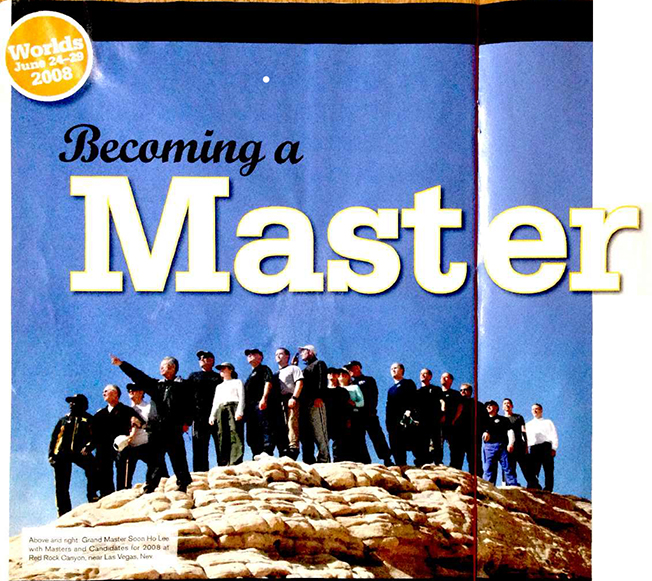
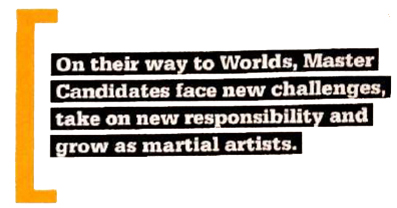
 ne of the writings in the Tao Te Ching (The Book of the Way), an ancient text of classic philosophy by Lao Tzu, explains: "He who knows others is wise; he who knows himself is enlightened; he who masters others is strong; he who masters himself possesses true power."
ne of the writings in the Tao Te Ching (The Book of the Way), an ancient text of classic philosophy by Lao Tzu, explains: "He who knows others is wise; he who knows himself is enlightened; he who masters others is strong; he who masters himself possesses true power." "The intellectual-spiritual component involves reading some of the classic martial arts texts, like The Art of War by Sun Tzu and The Book of Five Rings [by Miyamoto Musashi], as well as some books on Korean culture to learn about the heritage of Taekwondo," says Master Candidate Jordan Schreiber of Schreiber's ATA Martial Arts in Martinez, Calif.
"The intellectual-spiritual component involves reading some of the classic martial arts texts, like The Art of War by Sun Tzu and The Book of Five Rings [by Miyamoto Musashi], as well as some books on Korean culture to learn about the heritage of Taekwondo," says Master Candidate Jordan Schreiber of Schreiber's ATA Martial Arts in Martinez, Calif.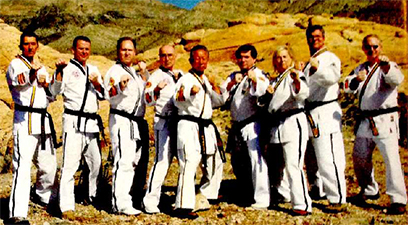 Master Candidate Jeffrey Hockman, owner of two schools in Columbia, Mo., says he experienced what he calls "a journey of self-discovery" as a result of the mental demands of mastership training. "I didn't realize that would happen," he says. "But once you start doing the requirements, the process makes you think quite deeply about who you are, who you've been and who you want to be--it's all encompassing."
Master Candidate Jeffrey Hockman, owner of two schools in Columbia, Mo., says he experienced what he calls "a journey of self-discovery" as a result of the mental demands of mastership training. "I didn't realize that would happen," he says. "But once you start doing the requirements, the process makes you think quite deeply about who you are, who you've been and who you want to be--it's all encompassing."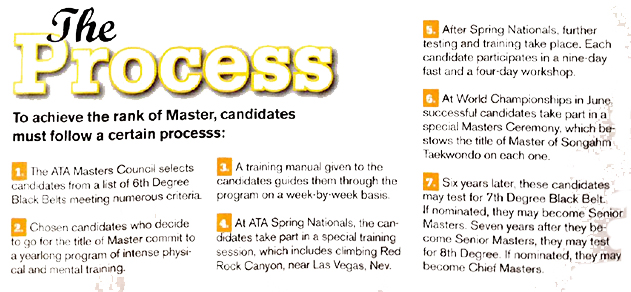
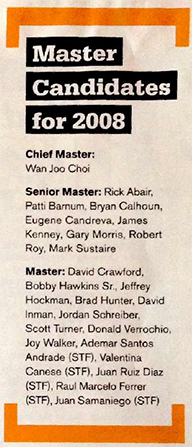 "It was more physical at the Master level, and it involves more mental processes at the Senior Master level," he says. "It is more about mental energy, the power of the focused mind, being able to draw on all the experience we've gained in the ATA." Although you still have to be able to execute the physical aspects of Taekwondo, he says, you use your body and mind together, in a more integrated practice of the martial art.
"It was more physical at the Master level, and it involves more mental processes at the Senior Master level," he says. "It is more about mental energy, the power of the focused mind, being able to draw on all the experience we've gained in the ATA." Although you still have to be able to execute the physical aspects of Taekwondo, he says, you use your body and mind together, in a more integrated practice of the martial art.